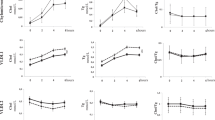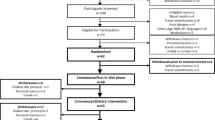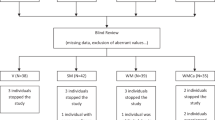Abstract
Objective: To study, if there are differences in the fatty acid composition of low‐density lipoprotein (LDL) in people eating three different long‐standing habitual diets: vegetarian, high fish intake, or high saturated fat (milk fat) diet as a control group, and to study if these differences influence the oxidation susceptibility of LDL.
Design: Cross‐sectional study using blood samples and a validated dietary frequency questionnaire with illustrations.
Setting: Helsinki University Central Hospital, Finland.
Subjects: The effect of three different types of long‐standing diets of different fatty acid content (a strict vegetarian diet, n=11; a high fish intake diet, n=9; and a high saturated fat (milk fat) diet, controls, n=7) on the serum and LDL fatty acid content, and on the susceptibility of LDL to oxidation in vitro, was studied in healthy normocholesterolemic volunteers who had been on these diets for years. Oxidation of LDL was carried out by using CuSO4 as a pro‐oxidant.
Results: There were no statistically significant differences in the serum lipids or lipoproteins, though the vegetarian group exhibited lowest mean values of total, high‐density lipoprotein (HDL) and LDL cholesterol levels. Both the serum and LDL eicosapentaenoic, docosapentaenoic and docosahexaenoic acid proportions were highest in the fish and lowest in the vegetarian groups. Linoleic acid was highest among the vegetarians. In the fish group, the vitamin A concentration in serum was higher than in vegetarians and controls and β-carotene lower than in controls, but in α‐tocopherol, or lycopene concentrations there were no statistically significant differences. The lag phase of LDL oxidation was shortest (116 min) in the fish group and longest (165 min) in the vegetarian group, and the control group was between them (129 min). The mean oxidation percentage after 2.5 h of copper‐induced oxidation was highest (44%) in the fish group and lowest (22%) in the vegetarian group and intermediate (31%) in the control group.
Conclusion: Long‐term dietary habits predict the fatty acid composition of serum and LDL, and influence the susceptibility of LDL to oxidation. In the fish group with the highest content of omega‐3 fatty acids in LDL, the oxidation susceptibility of LDL was highest. In the vegetarian group with less omega‐3 fatty acids in LDL, the LDL was more resistant to oxidation.
Sponsorship: Helsinki University Central Hospital.
This is a preview of subscription content, access via your institution
Access options
Subscribe to this journal
Receive 12 print issues and online access
$259.00 per year
only $21.58 per issue
Buy this article
- Purchase on Springer Link
- Instant access to full article PDF
Prices may be subject to local taxes which are calculated during checkout
Similar content being viewed by others
Author information
Authors and Affiliations
Contributions
Contributors: R Korpela: responsible for the dietary part, manuscript; L Seppo: subject recruiting, recording and calculating the living habits, dietary and nutrient intake; J Laakso: determination of LDL fatty acids; J Lilja: member of the study group; K Karjala: member of the study group (effects on vascular response); T Lähteenmäki: member of the study group (effects on proliferative effects); E Solatunturi: member of the study group (effects on platelet aggregation); H Vapaatalo: responsible for all the measurements, study initiator, study plan; MJ Tikkanen: LDL oxidation.
Corresponding author
Rights and permissions
About this article
Cite this article
Korpela, R., Seppo, L., Laakso, J. et al. Dietary habits affect the susceptibility of low‐density lipoprotein to oxidation. Eur J Clin Nutr 53, 802–807 (1999). https://doi.org/10.1038/sj.ejcn.1600860
Received:
Revised:
Accepted:
Published:
Issue Date:
DOI: https://doi.org/10.1038/sj.ejcn.1600860
Keywords
This article is cited by
-
HDL enhances oxidation of LDL in vitro in both men and women
Lipids in Health and Disease (2005)
-
Effects of vitamin E on the toxicity of oxidized LDL on endothelial cells in vitro in smokers vs nonsmokers on diets rich in fish
European Journal of Clinical Nutrition (2005)
-
Habitual fish intake is associated with decreased LDL susceptibility to ex vivo oxidation
Lipids (2002)



